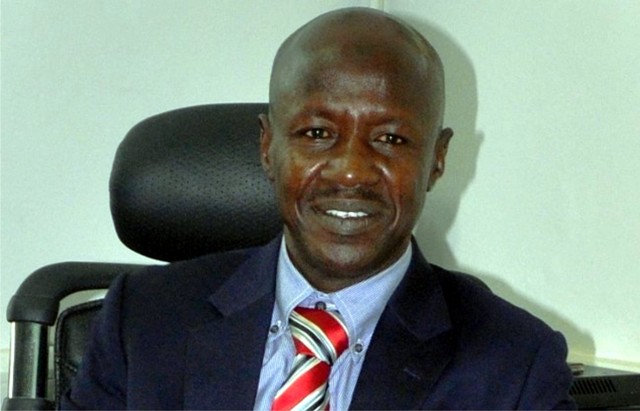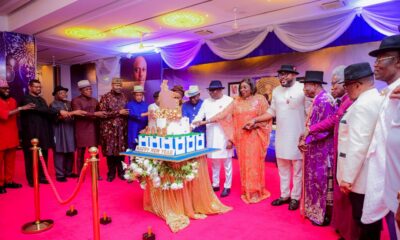Politics
Between Buhari’s Anti-Corruption Fight And The Polity

On assumption of office as President on May 29, 2015, Muhammadu Buhari had three cardinal focuses as far as his government was concerned: to curb insecurity, improve the economy, and fight corruption to a standstill.
Buhari’s emergence as Head of State and Commander of the Armed Forces of the country was thus viewed as a referendum of sort on the blight of institutionalised corruption, and the state of the country’s security.
In simpler terms, going by the highly proclaimed integrity of the President, many Nigerians were optimistic that he would stem the tide of unemployment, effectively deal with corruption, and crush Boko Haram and the like, to make Nigeria one of the safest place in the world.
With thirty-one days to the expiration of his first four years term in office, and commencement of another four year term, opinions are highly divergent in the extent to which the President, and the ruling party, the All Progressives Congress (APC), have fared in these key areas.
Although politicians expectedly support the stand of their party, even in sometimes ridiculously questionable circumstances, last Monday’s declaration by the Minister of Information and Culture, Lai Mohammed, that the government has a clean bill of health in all three spheres of focus, with particular emphasis on the fight against corruption, has brought the government’s performance in the period under review to more scrutiny.
The Minister, who spoke in a live TVC News Programme, stated that it will be unfair for Nigerians to measure the government’s achievements in the fight against corruption by the number of convictions it has secured.
According to him, the government has succeeded in laying enduring foundation for the fight against corruption through sustainable policies including institution of the Treasury Single Account (TSA), which ensures that all government money is paid into one account, and the Whistle Blower Policy.
“For us, success of the fight against corruption is the fact that we have driven corruption under the table and made it unattractive as it was before. Those who are corrupt are doing so with the fear of the law. It will progressively become more and more difficult in Nigeria for corruption to be attractive,” he said.
Analysts are of the belief that as much as the APC could be given some credit in its fight against corruption, the manner in which the fight is carried out has exposed all efforts put in it to question as to its real intention.
One of the earliest criticisms came in October 2015; just months after the government came into power. In a report by Sahara Reporters titled “Heavy Knocks for Buhari’s Anti-Corruption”, the Executive Chairman of the Coalition Against Corrupt Leaders, Debo Adeniran, claimed that he had severally petitioned the President and the anti-graft agencies, the Economic and Financial Crimes Commission ‘(EFCC) and Independent Corrupt Practices Commission(ICPC) over corruption and misappropriation of fund against Babatunde Fashola, a former Governor of Lagos State and the incumbent Minister for Power, Works and Housing in the Cabinet of President Buhari.
He also stated that several allegations of corruption and misappropriation of fund were slammed on Kayode Fayemi, the former Governor of Ekiti State; Kemi Adeosun, the estranged Minister of Finance, who was given the leeway out of retiring honourably after being found to be involved in National Youth Service Corp (NYSC) certificate forgery; and Rotimi Amaechi, a former Governor of Rivers State and current Minister of Transport.
Expressing concern over why these people were not invited by the anti-graft agencies for questioning, Adeniran said, “We are dissatisfied with the way the anti-corruption war is being fought and we are afraid that we may not achieve anything better than what we had before Buhari assumed office.
Mudiaga Affe summarised this in the Punch of April 22, 2019 when he said: “While the fight against corruption may have made some level of progress, the ruling party might have got itself involved in the whole twist by allegedly shielding some of its members fingered as suspects by the anti-graft agencies and welcomed other suspects to its fold”.
The government’s scorecard in security is also not encouraging. Stopping Boko Haram in three months, which was the promise of the Buhari-led government when it campaigned ahead of the 2015 election, has turned out to be a bed of explanations for failures, promises and assurances to do better, and more failures and promises.
The poor security situation cuts across the country: kidnappings, robberies, and killings associated to rituals are all on the high in all parts of the country. Rather than tackle the spate of insecurity in the land, like every other sensitive issue, it is politicised.
As the Nigerian government continues to search for a lasting solution to the Boko Haram insurgency, and other related security issues in the country, perhaps it is time to take the warning of retired Brigadier General Saleh Bala serious.
Bala once warned that playing politics with the Boko Haram insurgency would create a festering wound that could consume all facets of Nigeria’s resources.
“This is what is happening now. I strongly believe that we should have a national counter-insurgency strategy hinged on economic development, and the military strategy can pick up from there”’, he said.
Buhari and the APC did not fare any better in revamping the economy in their first tenure. An expert, and Chair of the Economics Department, Allegheny Collage, Professor Stephen Onyeiwu described Buhari’s economic scorecard thus:
“When he came to power in 2015, Buhari promised to tackle three interrelated problems: corruption, insecurity and the economy. Of the three, Nigerians regarded economic problems as paramount. But the administration appears to have focused on corruption and security issues and paid less attention to the economy.
“For example, Buhari failed to prevent an impending recession that followed the collapse of oil prices in 2015. This was because he didn’t prioritize the economy and took too long to articulate an economic transformation strategy.
“Another example of lack of focus on the economy was his meeting with US President Donald Trump in April 2018. Buhari asked for fighter jets, not economic support.
“Critics also point to the fact that Buhari ceded the management of the economy to his Vice President, Yemi Osinbajo. Though a brilliant lawyer, Osinbajo had no background or experience in economics. To make matters worse, Osinbajo surrounded himself with incompetent and inexperienced advisers.
“Buhari claimed he was unable to jump-start the economy because of falling oil prices and dwindling government revenue. Before he came to power the oil price was as high as $108 per barrel. It plummeted precipitously to $63 the month he was sworn in as president. The oil price continued to slide during the early stages of his administration, reaching an all-time low of $35 per barrel in February 2016.
“The collapse affected Buhari’s ability to put together a coherent budget. For instance, his 2016 budget had a deficit of over 2.2 trillion Naira. His attempt to borrow $30 billion to finance the deficit was vehemently opposed by the country’s lawmakers. Nor was public opinion favourable about an external loan. This forced the administration to pare down the number of projects it intended to undertake.
“Because of the administration’s inability to implement an expansionary fiscal policy, the economy has been grappling with anaemic growth since Buhari’s election. The country went into recession in 2016 followed by a rebound to about 2% in 2018. But the IMF projects that growth will remain weak at an annual average of about 1.9% from 2019 to 2023”.
What this means to the common man in the simplest of terms is that he found it more difficult to take care of his survival needs in the last four years than it had ever been in Nigeria.
But, like Professor Oyeiwu said, there is still room for improvement, if the “Next Level”” will address key economic issues. These, according to Oyeiwu, would require the President to evolve what he called a massive economic stimulus programme.
“If he can summon the energy, Buhari should significantly increase spending in sectors, projects and programmes that boost the economy generate employment and promote inclusive growth. He should prioritise infrastructure, labour-intensive manufacturing such as textiles and footwear, agro-processing, youth entrepreneurship projects, health and education.
“Nigeria has a very large stock of human and natural resources that are not being used optimally. Meanwhile, there is a huge infrastructural deficit. These range from dilapidated roads, epileptic electricity supply, acute water shortages, crumbling public buildings, grossly underfunded public tertiary institutions and so on. The gap can be closed through public works projects executed with direct labour”, Oyeiwu concluded.
Soibi Max-Alalibo
Politics
APP Wants INEC To Conduct By-Election To Fill Rivers Assembly Vacant Seats

Politics
NASS Sets Date For 2025 Budget Passage

Chairman, Senate committee on appropriations, Sen. Solomon Adeola, stated this on Monday in Abuja at a meeting with the chairmen of standing committees in the Senate.
According to him, Jan. 31 is the date for laying of reports on the appropriation bill before the Senate and the House of Representatives.
He said upon resumption from Christmas and New Year break on Jan. 14, both chambers of the national assembly would suspend plenary for two weeks for budget defence by ministries, departments and agencies (MDAs).
Sen. Adeola also said that NASS had fixed Jan. 9 for an open day on the budget to enable various stakeholders, aside heads of MDAs, to make inputs on the budget.
“A tentative time table has been drawn for consideration of the budget at committee level.
“Budget defence sessions begin from Jan. 7, while reports from various committees are expected to be submitted from 15th to 18th of this month.
“Afterwards, collation and tidying up of the various reports will be done by the appropriation committee, with the hope of laying final report on the budget at the Senate on 31st of this month.
“However, the 31st of January fixed for laying of the budget is tentative, as it is just given to guide our work,” he said.
The principal officers of the Senate who attended the meeting included: the Deputy Leader, Sen. Lola Ashiru and Senate Whip, Sen. Tahir Monguno.
They said that the timeframe for consideration and passage of the 2025 budget by the national assembly was short.
They, however, expressed hope on the timely passage of the budget.
The committee, thereafter, went into a closed door session with chairmen of the various standing committees in the Senate.
Politics
When Women Unite To Pray For SIM
-
Niger Delta4 days ago
NDDC Boss Thanks God For Transformation … Promises More Infrastructural Projects
-
Business4 days ago
NACCIMA Rep Urges Farmers To Exploit Hybrid Oil Palm Seedlings
-
News4 days ago
4 Professors, 2 SANs Unveil Book On FUBARAISM …Commend Rivers Gov’s Dev Strides
-

 Politics4 days ago
Politics4 days agoNASS Sets Date For 2025 Budget Passage
-

 News4 days ago
News4 days agoNothing’ll Stop Governance In Rivers, Fubara Assures …Says We Won’t Allow Anyone Take State For A Ride
-
Business4 days ago
Commissioner Blames Aging Infrastructure For TCN Woes
-
News4 days ago
Ikwerre Is Not Part Of Ndigbo, Group Warns
-
Sports4 days ago
Polo Players Storm Port Harcourt, Promise Exciting Experience

